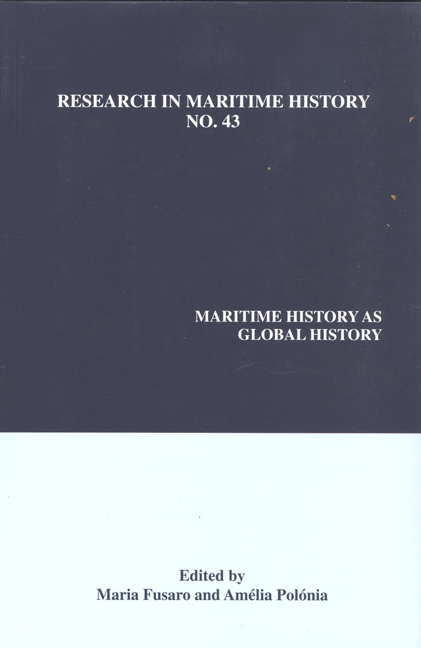Book contents
- Frontmatter
- Contents
- About the Editors
- Contributors' Notes
- “Maritime History: A Gateway to Global History?”
- “Behind the Atlantic Expansion: Flemish Trade Connections of Seville in 1620”
- “National and International Labour Markets for Sailors in European, Atlantic and Asian Waters, 1600-1850”
- “Maritime Expansion and (De)globalization? An Examination of the Land and Sea Trade in Seventeenth-Century Mughal India”
- “From Hold to Foredeck: Slave Professions in the Maritime World of the East India Company, c. 1660-1720”
- “Small Town Merchants, Global Ventures: The Maritime Trade of the New Julfan Armenians in the Seventeenth and Eighteenth Centuries”
- “Lighting up the World? Empires and Islanders in the Pacific Whaling Industry, 1790-1860”
- “Technological Advances in the Maritime Sector: Some Implications for Trade, Modernization and the Process of Globalization in the Nineteenth Century”
- “Lost in Calculation? Norwegian Merchant Shipping in Asia, 1870-1914”
- “Why Are the Major Oil Companies Selling Off their Fleets? The Case of Total”
- “Turning Maritime History into Global History: Some Conclusions from the Impact of Globalization in Early Modern Spain”
- “Maritime History as Global History? The Methodological Challenges and a Future Research Agenda”
“Technological Advances in the Maritime Sector: Some Implications for Trade, Modernization and the Process of Globalization in the Nineteenth Century”
- Frontmatter
- Contents
- About the Editors
- Contributors' Notes
- “Maritime History: A Gateway to Global History?”
- “Behind the Atlantic Expansion: Flemish Trade Connections of Seville in 1620”
- “National and International Labour Markets for Sailors in European, Atlantic and Asian Waters, 1600-1850”
- “Maritime Expansion and (De)globalization? An Examination of the Land and Sea Trade in Seventeenth-Century Mughal India”
- “From Hold to Foredeck: Slave Professions in the Maritime World of the East India Company, c. 1660-1720”
- “Small Town Merchants, Global Ventures: The Maritime Trade of the New Julfan Armenians in the Seventeenth and Eighteenth Centuries”
- “Lighting up the World? Empires and Islanders in the Pacific Whaling Industry, 1790-1860”
- “Technological Advances in the Maritime Sector: Some Implications for Trade, Modernization and the Process of Globalization in the Nineteenth Century”
- “Lost in Calculation? Norwegian Merchant Shipping in Asia, 1870-1914”
- “Why Are the Major Oil Companies Selling Off their Fleets? The Case of Total”
- “Turning Maritime History into Global History: Some Conclusions from the Impact of Globalization in Early Modern Spain”
- “Maritime History as Global History? The Methodological Challenges and a Future Research Agenda”
Summary
“Global history” is a relatively new historiographical concept, for the words “global” and “globalization” were seldom used before the 1970s. Indeed, it was not until the 1990s that these terms gained scholarly popularity. A clear indication of this is that historians, and even more so publishers, continued to offer “world” rather than “global” histories. Major surveys, such as those by James Foreman-Peck and Rondo Cameron, published in 1983 and 1989, respectively, were titled and marketed as “world histories.“ When scholars addressed the theme of maritime global markets in 1998 at the International Economic History Congress, there were varied interpretations and reservations as to whether globalization differed from the continuing process of internationalization. But in the last decade or so the term global has taken on a clearer conceptual status. “Global world,” “global economy” and “global village” are open to a variety of interpretations, but few would disagree that “[globalisation is…the integration of economic activities via markets. The driving forces are technological and policy changes – falling costs of transport and communications and greater reliance on market forces.“ Such a definition rightly emphasizes the revolution in communications that took place in the second half of the twentieth century in air, motor and sea transport, and especially in satellite technology and the internet. These advances have contributed to the integration and convergence of markets both in terms of prices and living standards.
Today's global economy is built on the foundations of an earlier world economy – created in the late nineteenth century – that was to a considerable degree similarly based on a communications revolution. It is our contention – and a key theme of this essay – that there is a difference between the communications revolution that led to the creation of a world economy and that which in the later twentieth century gave rise to a global economy in that the former was primarily maritime-based.
This essay examines the technological advances that comprised the communications revolution of the nineteenth century with an emphasis on the maritime dimension. These were the steamship, the railway and the telegraph. At first sight the “maritime” appears to be only one of three elements, but we argue that the maritime dimension of the communications revolution and its significance was far wider.
- Type
- Chapter
- Information
- Maritime History as Global History , pp. 177 - 202Publisher: Liverpool University PressPrint publication year: 2010



